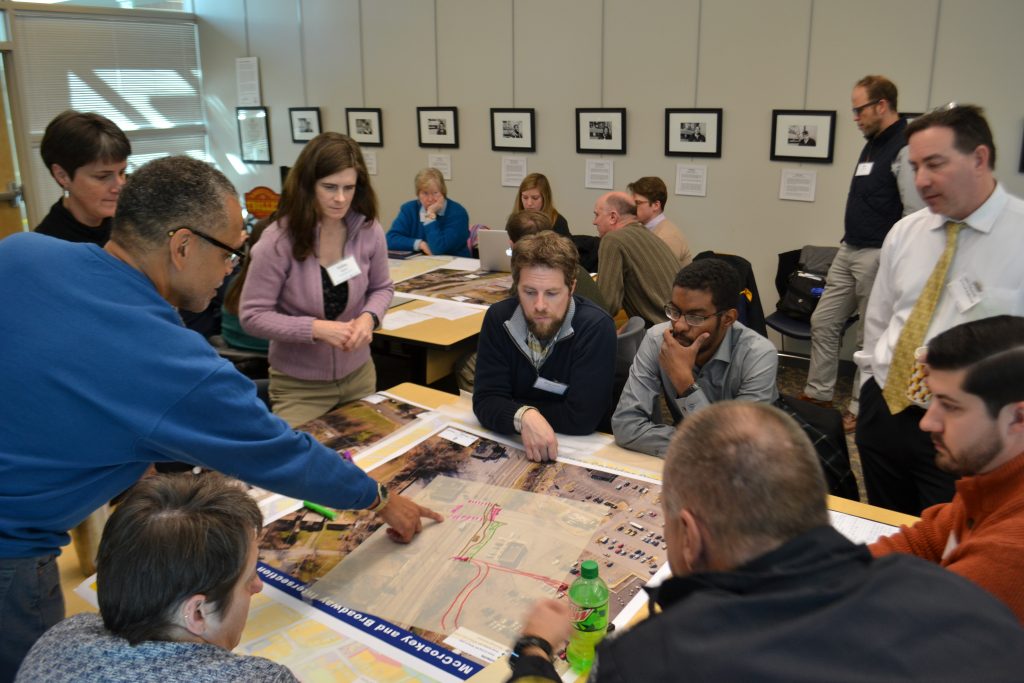
News
By Smart Growth America, August 16, 2018

Between September 2017 and January 2018, the National Complete Streets Coalition worked with 30 transportation professionals from the Nashville, Knoxville, and Chattanooga regions in Tennessee to identify and overcome common barriers to Complete Streets implementation. In the seven months since then, each region has taken steps to move Complete Streets forward in their communities.
The Nashville Area Metropolitan Planning Organization (Nashville Area MPO), Knoxville Regional Transportation Planning Organization (Knoxville Regional TPO), and Chattanooga–Hamilton County/North Georgia Transportation Planning Organization (Chattanooga TPO) recently participated in the first ever Complete Streets Consortium Series. Each region assembled a diverse team of ten professionals—representing the engineering, planning, public works, transit, economic development, community engagement, public health, and law enforcement fields—to work with the National Complete Streets Coalition. They identified common challenges and opportunities for Complete Streets and developed better strategies to collaborate with their state department of transportation—and with each other—to support Complete Streets implementation. Since the final workshop in January, all three regions have been working to improve collaboration across jurisdictions and overcome barriers to Complete Streets implementation.
Collaboration across jurisdictions
One of the main goals of the Complete Streets Consortium Series was to build better working relationships within and across jurisdictions. All three regions have seen improved collaboration on Complete Streets since the conclusion of the Tennessee Consortium Series.
- In the Nashville region, stronger relationships between the MPO and local jurisdictions has helped them design better Complete Streets projects and build support for comprehensive planning efforts.
- In the Chattanooga and Knoxville regions, the Consortium Series teams have held regular meetings to coordinate on data collection, local and regional planning, and funding and designing Complete Streets projects.
- All three regions have also continued to work more closely with the Tennessee Department of Transportation (TDOT) to incorporate Complete Streets improvements into repaving projects, improve safety for people walking and biking on state-owned roads, and train staff on best practices in Complete Streets project design.
This improved collaboration has already led to benefits in each region.
- The Nashville Area MPO is working closely with local partners to redesign the intersection of Nolensville Pike and Elysian Fields Road to make it safer for people walking and biking.
- The Knoxville region, through improvements to its bicycle and pedestrian crash database, was able to measure the benefits of Complete Streets projects, including a road diet on Cumberland Avenue that reduced the average number of bicycle and pedestrian crashes over a seven-month period from 3.5 to 0.
- And in the Chattanooga region, local and regional jurisdictions are working together to compile a database of bicycle and pedestrian infrastructure and identify high priority gaps in their sidewalk and bikeway networks.
Addressing barriers to Complete Streets
During each workshop of the Complete Streets Consortium Series, the teams visited areas that highlighted key challenges each region is facing to implement Complete Streets. All three regions have taken concrete steps to overcome these challenges.
- At the Chattanooga workshop, we visited Ooltewah-Ringgold Road, where poor street connectivity made it difficult for people to reach nearby schools and grocery stores without taking long, circuitous routes across major roads. Since the workshop, the Chattanooga TPO has launched the People Places Paths project to study street connectivity across the county and identify opportunities for improvement.
- In Nashville, we visited Charlotte Pike, a major bus corridor with few to no sidewalks and crosswalks, especially at major bus stops. The Nashville Area MPO has since updated its project selection criteria to look more closely at how proposed projects will impact walking and biking rates, improve safety, and provide better access to grocery stores, hospitals, parks, and public transit stations.
- Finally, in Knoxville, we saw examples of how sprawling land use can make it difficult to create walkable, bikeable places—even with Complete Streets—when we visited Broadway. To encourage denser, more walkable development, the Knoxville TPO has been working with the City of Knoxville on Recode Knoxville, a project to update the city’s outdated zoning ordinance with particular emphasis on how land use can support Complete Streets.
We’re excited to see how much progress these regions have made in the short time since we worked with them, and look forward to how these efforts unfold moving forward. Thank you to all three regions and to all the participants of the Complete Streets Consortium Series for all your hard work.
—
The Complete Streets Consortium Series was made possible by a Building Blocks for Sustainable Communities grant from the U.S. Environmental Protection Agency’s Office of Community Revitalization in partnership with the Centers for Disease Control and Prevention. For more information on Smart Growth America’s Technical Assistance program and how your community can request assistance from Smart Growth America on a variety of land use, development, and transportation challenges, please visit our technical assistance home page.
Related News

© 2025 Smart Growth America. All rights reserved
Site By3Lane Marketing








